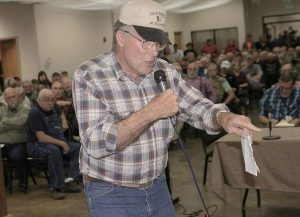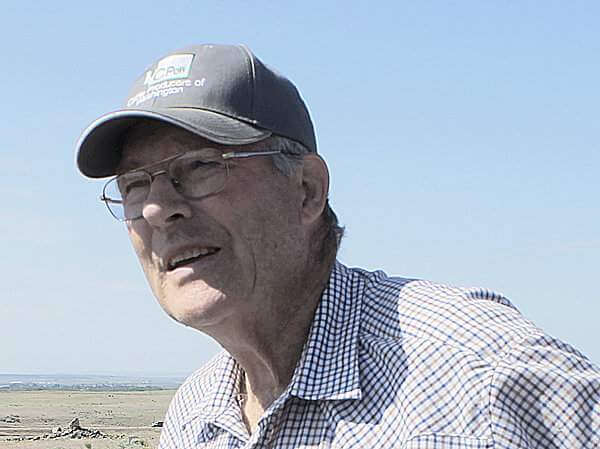
(Protect The Wolves) McIrvin really needs to stop blaming a 70 cow loss on Wolves …. Face it Len, you are in wildlife country, if you do not like it We suggest you move 😉 in 2016 McIrvin claimed it was over 100…. Good thing there is Rubber Barn Boots because his stories are getting deep with B.S.
Fewer cows have been breeding on the range since wolves migrated to northeast Washington, an economic loss little known outside the cattle industry, according to the owners of the region’s largest ranch.
The Diamond M ranch estimates that the rate of “open cows” — females that didn’t become pregnant — has increased to about 20 percent from the historic rate of 5 percent.
“If wolves were attacking people night and day, I don’t think you’d have too many people pregnant,” said Len McIrvin, the patriarch of the family-owned and -operated ranch.
The Diamond M has been impacted by wolf recovery for a decade. The Washington Department of Fish and Wildlife has culled wolfpacks that attacked the ranch’s cattle. Thrust into the spotlight, the Diamond M has been vilified by some environmental groups.
McIrvin said he’s accepted the public role and resulting attacks because it’s necessary to put a face on the problems caused by wolves. “If you’re in a war, you can’t run away. You have to have troops on the front lines. You can’t hide in the shadows forever,” he said.
The ranch rounded up a couple hundred open cows in May from its winter range in southeast Washington. To cover its costs, a cow must raise a calf every summer. The open cows went to an auction yard across the Columbia River in Hermiston, Ore.
The cows fetch something at auction, but they would have been worth more producing calves — in some cases for several more years. “That’s quite a slug of cows they’re not going to have,” said Bill McIrvin, Len’s son.
Diamond M’s size and the fact that it has a winter range to graze cattle year-round has helped it absorb losses. As the wolf population grows, smaller ranchers who can’t afford as many losses will have a hard time staying in business, the McIrvins said.
“What was affecting us will start affecting everyone, and they just can’t stand the loss,” Bill McIrvin said. “The whole system is pretty tough to live with from the get-go.”
Steve McLaughlin, a retired Navy commander who unsuccessfully ran for state lands commissioner in 2016, says he wants to help ranchers document their damages to inform the public debate over managing wolves. He’s coordinating an effort to systematically collect reports of losses. “We’re not hearing the economic side of things,” he said.
Len McIrvin said he welcomed the project. “Steve has done a terrific job of leading this fight,” he said.
The ranch loses about 70 head to wolves a year, Len McIrvin said. State wildlife managers typically confirm a handful of depredations. Ranchers can apply for compensation for losses. To avoid giving tacit approval to Fish and Wildlife’s management of wolves, the McIrvins said they haven’t and won’t seek compensation.
“It’s such a crooked, damn deal they’re throwing at us,” he said. “Wolves and cattle are like oil and water. They do not mix, and they never will.”
Ranchers can also apply to be compensated for such “indirect losses” as underweight cattle and more open cows.
A rancher must provide business records and exhaust other possible sources of compensation, such as from environmental groups. No rancher applied for compensation for indirect losses in 2017.
Ranchers blame wolf-caused stress for thin and unbred cows. They say cattle are visibly shaken in wolf country. A 2017 study involving the Eastern Oregon Agricultural Research Center in Burns supports the observation.
Cows were subjected to cotton balls soaked in wolf urine and the reproduction of wolf howls for 20 minutes. They were immediately slaughtered and their brains examined. Researchers reported finding biological markers suggesting post-traumatic stress disorder.
The study’s lead author, Reinaldo Cooke, said that the Diamond M’s report of more open cows “makes perfect sense to me.”
“This kind of report is very common in Oregon and Idaho,” said Cooke, who is now an associate professor of beef production at Texas A&M University.
Source: Wolves breed problems for Washington ranchers – Livestock – Capital Press

Comments
Pingback: More false Claims from McIrvin | Protect The Wolves
I stand for wolves! Stop letting cows graze in National Forest, making false claims for compensation from the government